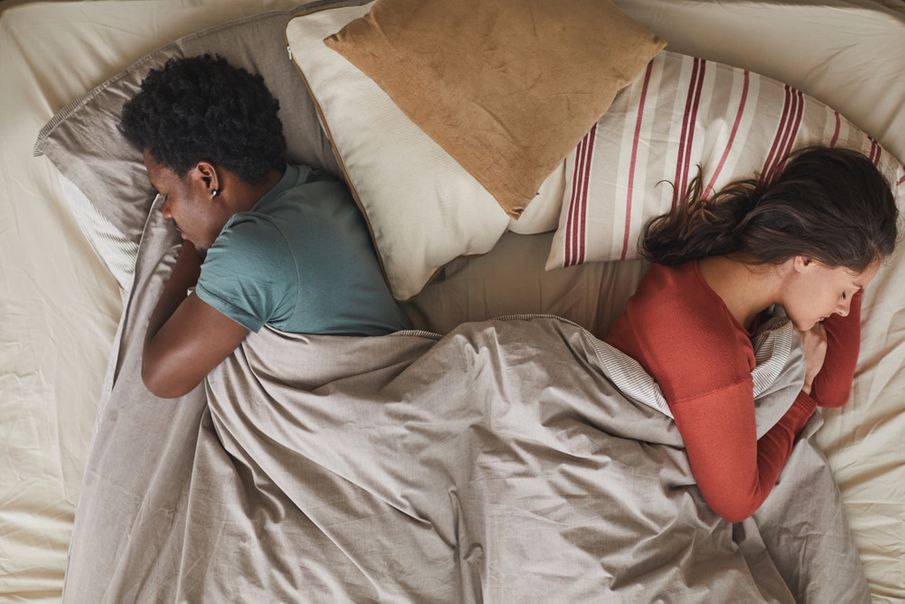The rate of couples who live together but chose to sleep separately has almost doubled in the past decade
Once a staple in long-term relationships, a new survey from the National Bed Federation has found that nearly one in six (15%) UK couples who live together are now choosing to sleep separately, with 89% moving into their own bedrooms.
And breaking from tradition is seemingly on the rise, with the number of couples now opting to go their own way when the lights go out almost doubling in the past decade, up from 7% of couples in a survey by The Sleep Council from 2009.
So why is this happening?
James Wilson, AKA the Sleep Geek, is one of the UK’s leading sleep behaviour and environment experts, but he believes that the cause behind the souring stats is hard to pin down precisely.
“It’s individual to every different person,” James tells Happiful. “Part of the process of falling asleep is a drop in heart rate, and some people find this easier to achieve alone and some sleeping next to another.
“Maybe they are a light sleeper, or their partner snores, or they are living with the menopause, or maybe they just prefer to sleep alone,” he continues. “People with these experiences report that they sleep better in terms of quality and quantity when they’re alone. Other people miss their partners when they are not there, and therefore struggle to sleep alone. Their partner gives them emotional security, relaxes them and allows them to fall asleep feeling safe.”

Clio Wood has been with her husband for 12 years, but – as “chronic insomniacs” – the couple recently took the step to sleep separately.
“I don't know why it took us so long to do it!” Clio says. “Our sleep ebbs and flows – sometimes he's better than me and vice versa, depending on stress levels and mental health – so it makes sense that we have less distraction in bed when we're struggling to sleep.”
For Clio, this arrangement means that she and her husband are able to go about their own routines without disturbing the other. A little reading, sleep stories, and essential oil diffusions can all take place freely. As for their sex life? Clio says that a visit to each other’s room makes it that much more special.
“It took me a while to come to terms with sleeping in separate rooms, because it's so culturally accepted that couples do,” she adds. “But, as our relationship is doing much better than before, I can only conclude that it's a good thing!”
89% of couples who sleep seperately move into their own bedrooms
Of course, moving into seperate bedrooms isn't the only option when it comes to exploring your own space. Emma Pierce, who has been with her partner for eight years, has invested in two single beds pushed together – meaning that they are both able to sleep on their preferred mattress firmerness and under the ideal togged duvet.
To put it simply, this arrangment is what works best for Emma and her partner.
“It comes down to comfort,” says Emma. “It's more important that we've had as restful a sleep as possible, than been in the same space.”
And with the NHS reporting that one in three people will experience sleep problems in their lifetime, and the clear link between sleep and mental wellbeing, breaking from convention in order to address our needs only makes sense.
As is so often the case when it comes to relationships, communication is key – and asking for what you need from your partner is often the first step to a healthy dynamic. And if that step is readdressing your sleeping arrangement, like 15% of the UK, then so be it.
But for those who are still keen to stay in close quarters to their partner, James has some tips for making shared sleep work for you:
Timing is key
Find a bedtime that works for each of you. Both people should be falling asleep within 30 minutes of going to bed.
Size matters
We sleep in very small beds in the UK, a double bed gives each person less space than a baby has in a cot! So have as big a bed as your room will allow.
Soothing scents
If you need your partner to sleep well, and they are not there, spray their perfume on your pillow. Their smell will help relax you.
The Goldilock zone
If you have different temperature needs, use separate duvets so you can create an immediate sleep environment that works for both people.
Whether you’re a spooning aficioando or the thought of solo-sleep sounds like a dream come true, it’s about time we put insomnia to rest and made sleep wellness a priority.
For more information on James Wilson aka The Sleep Geek visit thesleepgeek.co.uk


Comments